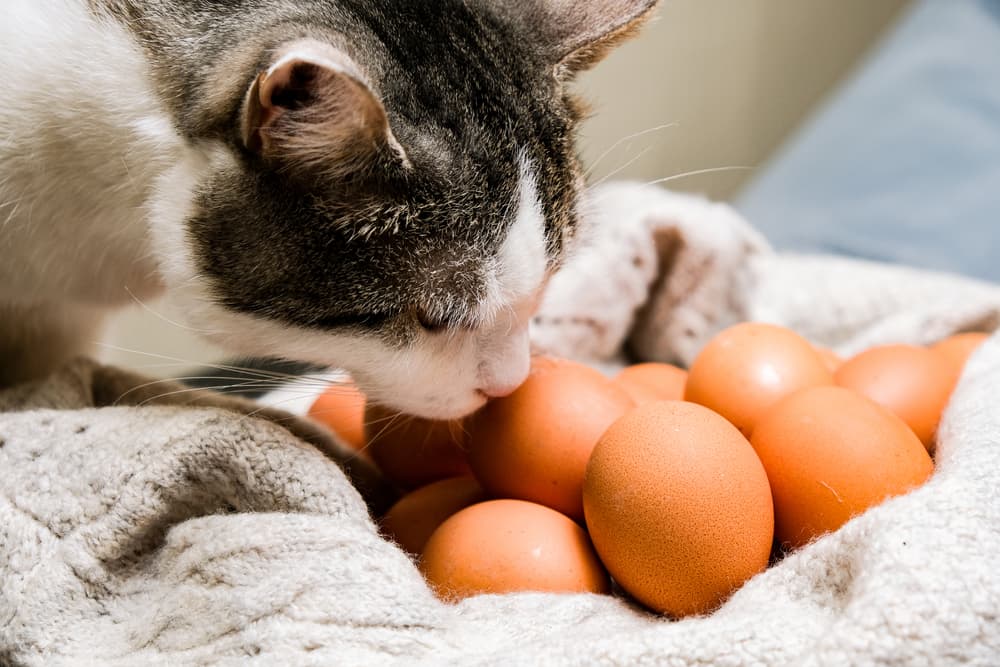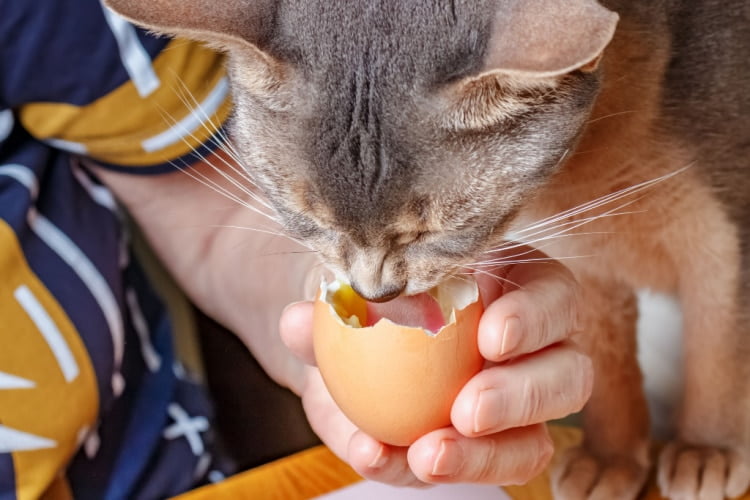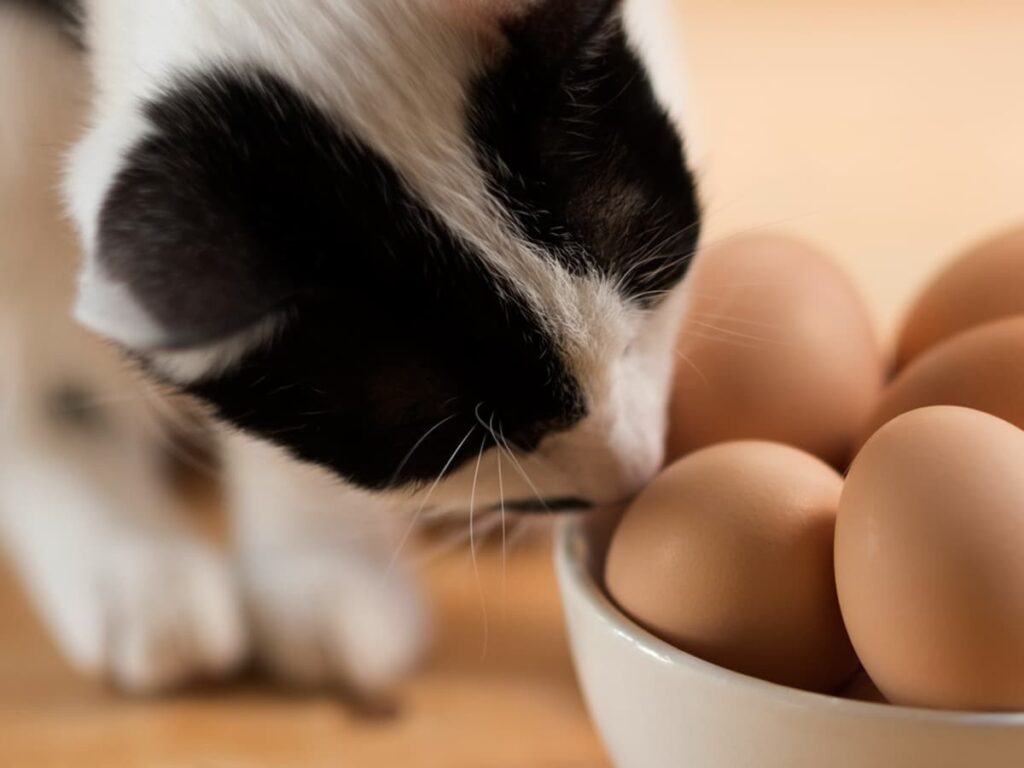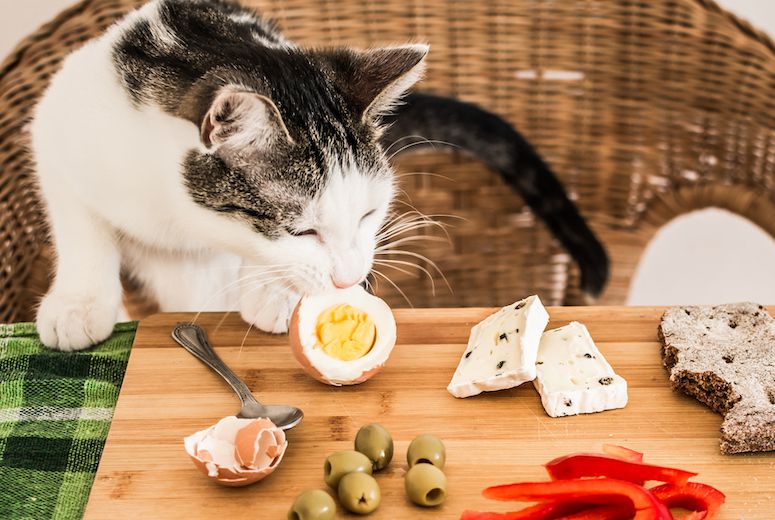Can Cats Eat Raw Chicken Eggs: Everything You Need to Know

Cats have an innate curiosity when it comes to exploring new foods, and as responsible cat owners, it’s our duty to ensure we provide them with a safe and suitable diet. One question that often arises in discussions about feline nutrition is whether cats eat raw chicken eggs. Raw eggs are a common dietary staple for many people, but can our feline companions enjoy them too?
In this blog post, we will thoroughly examine this topic to provide you with comprehensive information, allowing you to make informed decisions regarding your cat’s dietary choices. We will explore the potential risks and benefits associated with feeding raw chicken eggs to cats, consider their unique dietary requirements, and provide practical guidelines to ensure the health and well-being of your furry friend.
So, if you’ve ever wondered about the possibility of incorporating raw chicken eggs into your cat’s diet, you’ve come to the right place. Let’s dive into the fascinating world of cats and their potential consumption of raw chicken eggs.
- Understanding a Cat's Diet
- Exploring Raw Chicken Eggs: Potential Risks
- Evaluating the Benefits of Raw Chicken Eggs for Cats
- Feeding Raw Chicken Eggs to Cats: Precautions and Guidelines
- Alternatives to Raw Chicken Eggs
- Introducing Raw Chicken Eggs to Cats: Step-by-Step Guide
- Common Concerns and FAQs
- Conclusion
Understanding a Cat’s Diet
Cats are fascinating creatures with unique dietary requirements. As obligate carnivores, their bodies have evolved to thrive on a meat-based diet. Unlike omnivorous animals that can derive nutrition from both plant and animal sources, cats rely heavily on animal protein for their overall health and well-being. Protein is essential for maintaining muscle mass, supporting organ function, and promoting healthy skin and coat.
When considering whether cats can eat raw chicken eggs, it’s important to evaluate the potential benefits and risks associated with this specific food option. Raw chicken eggs offer a rich source of protein, along with essential nutrients such as vitamins and minerals. Protein derived from eggs can complement a cat’s diet and provide vital amino acids necessary for various physiological processes.
However, it’s equally vital to understand the potential risks involved in feeding raw chicken eggs to cats. Raw eggs can carry harmful bacteria, including Salmonella, which can pose a significant health risk to both cats and humans. Cats may also have a sensitive digestive system, making them more prone to digestive issues when consuming raw eggs. Furthermore, raw egg whites contain a protein called avidin, which can interfere with the absorption of biotin, an important vitamin for a cat’s coat and skin health.
To ensure a cat’s dietary needs are met while minimizing potential risks, it’s crucial to explore alternative sources of animal protein that are safe and nutritionally balanced. Consulting with a veterinarian is highly recommended to develop a suitable diet plan tailored to the specific needs of your cat. They can provide expert guidance on choosing high-quality protein sources and help you make informed decisions about incorporating raw chicken eggs or other options into your cat’s diet.
By understanding the unique dietary requirements of cats and carefully considering the potential benefits and risks associated with raw chicken eggs, we can ensure that our feline companions receive the appropriate nutrition they need to thrive while maintaining their overall health and well-being.
Exploring Raw Chicken Eggs: Potential Risks

When considering feeding raw chicken eggs to cats, it’s crucial to understand the potential risks involved. These risks primarily revolve around bacterial contamination, digestive sensitivities, and the interference of avidin with biotin absorption. Let’s take a closer look at each of these risks.
- Bacterial Contamination: Raw chicken eggs can carry harmful bacteria, such as salmonella, which pose a significant health risk to cats and humans alike. These pathogens can cause severe gastrointestinal distress and lead to foodborne illnesses. Cats, with their unique physiology, are particularly susceptible to bacterial infections.
- Digestive Sensitivities: Cats may have sensitive digestive systems that can be easily upset by consuming raw eggs. This can result in gastrointestinal issues like vomiting, diarrhea, or stomach discomfort. Cats with pre-existing digestive conditions or weakened immune systems may be at higher risk of adverse reactions. Therefore, you can also follow a homemade diet for cats with liver disease.
- Avidin Interference: Avidin is a protein present in raw egg whites that can interfere with the absorption of biotin. Biotin is an essential vitamin for cats, crucial for maintaining healthy skin and coat. If biotin absorption is compromised, it can lead to skin problems and a dull or brittle coat.
Precautions
To address these risks, it’s important to take certain precautions when considering raw chicken eggs as part of a cat’s diet.
- Proper Sourcing and Freshness: Ensure that the eggs come from a reliable and reputable source, preferably organic or from pastured chickens. Freshness is vital, as older eggs are more prone to bacterial contamination. Avoid using cracked or visibly damaged eggs.
- Cooking the Eggs: Cooking eggs thoroughly can eliminate the risk of bacterial contamination and reduce the presence of avidin. Cooked eggs can still provide valuable protein and nutrients for cats, making them a safer alternative.
- Alternative Protein Sources: If the risks associated with raw chicken eggs are a concern, consider exploring other sources of animal protein that are safe and nutritionally balanced for cats. Consult with a veterinarian to develop a diet plan that meets your cat’s unique needs.
By being aware of the potential risks and taking appropriate precautions, you can ensure the safety and well-being of your beloved feline companion. As always, it’s important to consult with a veterinarian before making any significant dietary changes for your cat to receive personalized guidance based on their specific health and nutritional requirements.
Evaluating the Benefits of Raw Chicken Eggs for Cats

Raw chicken eggs can provide several nutritional benefits that are advantageous for cats. They offer a rich source of essential nutrients, including vitamins, minerals, and high-quality protein. Incorporating eggs into a cat’s diet can be beneficial in supplementing their nutritional needs.
- Essential Nutrients: Eggs are packed with important vitamins such as vitamin A, vitamin D, vitamin E, and various B vitamins, which play a vital role in supporting a cat’s overall health. They also contain minerals like calcium, phosphorus, and selenium, which are essential for bone strength, cellular function, and antioxidant defense.
- High-Quality Protein: Protein is a fundamental component of a cat’s diet, as they are obligate carnivores. Raw chicken eggs provide a high-quality source of protein, offering a complete amino acid profile necessary for various physiological processes. Protein supports muscle maintenance, organ function, and the production of essential enzymes and antibodies.
- Omega-3 Fatty Acids: Eggs are a natural source of omega-3 fatty acids, which have been associated with numerous health benefits. These beneficial fatty acids can contribute to improved coat and skin health in cats, helping to promote a glossy coat, reduce inflammation, and alleviate skin conditions.
While raw chicken eggs offer potential benefits, it’s important to consider the overall balance of a cat’s diet. Raw eggs should not be the sole source of nutrition but rather a complement to a well-rounded and nutritionally complete diet. Consulting with a veterinarian is crucial to ensure that the inclusion of raw chicken eggs aligns with your cat’s specific dietary requirements.
Feeding Raw Chicken Eggs to Cats: Precautions and Guidelines

Feeding raw chicken eggs to cats requires careful consideration and adherence to specific precautions and guidelines. Here’s what you need to keep in mind:
- Moderation is key: Offer eggs to cats in controlled portions as a supplemental food, taking into account their overall dietary needs.
- Freshness and quality matter: Ensure that the eggs you provide are fresh and of high quality. Choose eggs from reputable sources, preferably organic or from pastured chickens. Avoid using eggs that are past their expiration date or show signs of damage or spoilage.
- Minimize bacterial contamination risk: Raw eggs can potentially harbor harmful bacteria such as salmonella. To reduce this risk, handle raw eggs with care, and practice good hygiene. Wash your hands thoroughly after handling them and clean any surfaces or utensils that come into contact with raw eggs to prevent cross-contamination.
- Cooking as a safer alternative: If you are concerned about the potential risks associated with raw eggs, consider cooking them before feeding them to your cat. Thoroughly cooking eggs helps eliminate bacteria and reduces the risk of foodborne illnesses. Cooked eggs can still provide valuable nutrients for cats while minimizing the chances of adverse reactions.
Remember to consult with your veterinarian before introducing raw chicken eggs or making significant dietary changes for your cat. They can provide personalized advice and guidance based on your cat’s specific health needs, ensuring a safe and balanced diet. By following these precautions and guidelines, you can ensure the well-being of your feline companion when incorporating raw chicken eggs into their diet.
Alternatives to Raw Chicken Eggs
When it comes to providing alternatives to raw chicken eggs for your cat, there are various options to consider. Each alternative offers its own benefits and considerations. Let’s explore some alternatives that you can incorporate into your cat’s diet.
- Cooked Eggs: Cooked eggs can be a suitable alternative to raw chicken eggs for your cat. While cooking may alter some of the nutrients, thoroughly cooked eggs still provide nutritional benefits. Cooking eggs eliminates potential pathogens, reducing the risk of foodborne illnesses. Consider feeding cooked eggs as a safe option for your cat’s diet.
- Raw Chicken: Raw chicken can serve as an alternative protein source for cats. It is important, however, to handle raw chicken with care to avoid bacterial contamination. Consult with a veterinarian to ensure proper handling techniques and portion control when including raw chicken in your cat’s diet.
- Chicken Liver and Beef Liver: Organ meats like chicken liver and beef liver are nutrient-dense alternatives for cats. They offer essential vitamins and minerals that contribute to a balanced diet. It is recommended to feed organ meats in moderation and ensure they come from reliable sources.
- Raw Vegetables: Although cats are obligate carnivores, offering small amounts of raw vegetables as treats or dietary enrichment can be an option. However, it’s important to remember that vegetables should not replace the core protein requirements in a cat’s diet. Consult with a veterinarian to determine suitable vegetables and portion sizes for your cat.
- Commercial Cat Foods: Consider exploring commercial cat foods that provide egg-based options. These formulated diets ensure a balanced nutritional profile for your cat and can serve as a convenient alternative to raw eggs. Choose reputable brands and consult with a veterinarian for recommendations and guidance on selecting the right commercial cat food.
Consulting with a veterinarian is crucial when considering alternative options for your cat’s diet. They can provide personalized advice based on your cat’s specific dietary requirements, considering factors such as age, health conditions, and individual preferences. By incorporating suitable alternatives and working closely with a veterinarian, you can ensure your cat receives a safe and balanced diet.
Introducing Raw Chicken Eggs to Cats: Step-by-Step Guide

Introducing raw chicken eggs to your cat’s diet requires a step-by-step approach to ensure a smooth transition. Here is a helpful guide to follow:
- Start with Small Portions: Begin by offering small portions of raw chicken eggs to your cat. This allows their digestive system to adjust to the new food gradually. It also helps you observe their response and ensures they tolerate the eggs well. A small portion could be half of a beaten raw egg or a small piece of raw egg yolk.
- Monitor Your Cat’s Response: As you introduce raw eggs, closely monitor your cat for any signs of allergies or intolerance. Watch for symptoms such as vomiting, diarrhea, or changes in appetite. If you notice any adverse reactions, discontinue feeding raw eggs and consult with a veterinarian.
- Consider Digestibility and Overall Well-being: Observe how well your cat digests raw eggs and their overall well-being. Some cats may have sensitive stomachs or difficulty digesting raw foods. Keep an eye on their stool quality and energy levels to ensure they are thriving on the new addition to their diet.
- Incorporate Eggs into a Balanced Diet: Raw chicken eggs should be considered as a supplement to a balanced diet rather than the sole source of nutrition. Ensure that your cat’s diet includes a variety of high-quality protein sources, such as lean meats or commercially formulated cat foods. Consult with a veterinarian to create a well-rounded and nutritionally complete meal plan for your cat.
- Seek Veterinary Guidance: Before making any significant dietary changes or introducing raw chicken eggs, it’s always advisable to consult with a veterinarian. They can assess your cat’s specific needs, provide professional advice, and guide you through the process of incorporating raw eggs into their diet safely.
Remember that not all cats will tolerate or benefit from raw chicken eggs. Some cats may have specific dietary restrictions or health conditions that require alternative feeding options. Your veterinarian can help you determine the best course of action based on your cat’s individual needs.
By following this step-by-step guide and working closely with your veterinarian, you can introduce raw chicken eggs to your cat’s diet in a careful and responsible manner, ensuring their overall health and well-being.
Common Concerns and FAQs
Some common concerns and questions may arise when considering feeding raw chicken eggs to cats. Here are a few frequently asked questions along with their answers:
- Can kittens eat raw chicken eggs?
Kittens have delicate digestive systems and developing immune systems. It is generally recommended to avoid feeding raw chicken eggs to kittens due to the risk of bacterial contamination. Kittens have specific nutritional needs that are best met through a balanced diet formulated for their growth and development. Consult with a veterinarian to determine the appropriate diet for kittens. - What if my cat has a pre-existing health condition?
If your cat has a pre-existing health condition, such as a weakened immune system or gastrointestinal issues, it is crucial to consult with a veterinarian before introducing raw chicken eggs. They can assess your cat’s condition and provide guidance on whether raw eggs are suitable or if alternative feeding options should be considered. - Are there any signs of raw egg intolerance in cats?
Some cats may exhibit signs of intolerance or allergies to raw eggs. These signs can include vomiting, diarrhea, excessive itching, or changes in behavior or appetite. If you notice any of these symptoms after feeding raw eggs, it is advisable to discontinue their consumption and consult with a veterinarian for further evaluation and guidance. - Can feeding raw chicken eggs cause nutritional imbalances?
While raw chicken eggs offer nutritional benefits, they should be considered as part of a balanced diet. Relying solely on raw eggs may lead to nutritional imbalances. It is important to provide a variety of protein sources and consult with a veterinarian to ensure your cat’s nutritional needs are met. - How often should I feed raw chicken eggs to my cat?
Feeding raw chicken eggs to your cat should be done in moderation. As a general guideline, one to two raw eggs per week can be considered. However, the frequency may vary depending on your cat’s individual needs, overall diet, and any specific health considerations. Consulting with a veterinarian can help determine the appropriate frequency for your cat.
By addressing these common concerns and providing answers to frequently asked questions, you can gain a better understanding of the implications of feeding raw chicken eggs to cats. However, it is always recommended to consult with a veterinarian for personalized advice and guidance based on your cat’s specific needs and circumstances.
Conclusion
So, can Cats eat Raw Chicken Eggs? Yes, they can.
However, the decision to feed your cat raw chicken eggs should be based on careful consideration and understanding of the potential risks and benefits.
While raw eggs can offer nutritional value, they also come with concerns such as bacterial contamination and digestive sensitivity. It’s advisable to consult with a veterinarian, conduct further research, and make an informed choice that aligns with your cat’s unique needs. Your veterinarian can provide personalized recommendations to ensure your cat’s dietary requirements are met while maintaining their health and safety.


